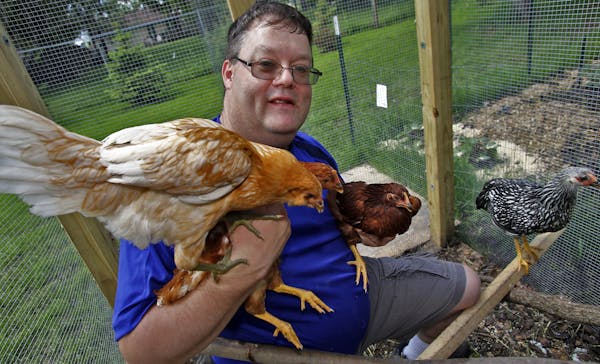Two small Lake Minnetonka communities are the latest to jump into the hot debate over allowing back-yard chickens — an issue that's increasingly confronted metro suburbs.
But for Deephaven and Woodland, the unconventional animal request poses a new challenge as they are smaller cities with fewer resources to manage it. On Monday, about 50 Deephaven residents are expected to pack City Hall to try to convince divided city leaders that back-yard chickens can work there like they do in more than a dozen metro cities.
"It's just one of those emotional issues where people think the worst will happen," resident Jillian McGary said. "It bothers me as a property owner that I can't use my land to grow my food."
One of the critics she's trying to convince is her back-yard neighbor, Paul Skrede, the city's mayor. He didn't return messages for comment, but he's one of the council members who has voiced concern to the change, saying it could breed complaints that the 3,000-resident city won't have the resources to handle.
"We're not the city of Minneapolis, and we don't have those resources," Council Member Steven Erickson added in an interview. "I just don't see it being advantageous in the city, but if the residents put up enough [of a case for chickens] ... I'm not going to actively block it."
Chickens' 'PR problem'
It's a debate that more metro cities have faced over the past few years as everyone from 4-H students to sustainability enthusiasts push for locally grown food. Minneapolis and St. Paul allow chickens, as do suburbs such as Bloomington, St. Louis Park, Minnetonka, Burnsville and Robbinsdale, usually with restrictions such as prohibiting roosters or containing the flock size.
In Woodland, one resident's recent request has spurred the city to draft an ordinance that could be voted on this fall.
"Given the popularity of this activity, we thought we should at least consider an ordinance," Woodland Mayor Jim Doak said. "It's a reasonable request."
But not every city is a fan of the fowls. Cities such as White Bear Lake, Wayzata and Eden Prairie have opted to keep chickens outlawed.
"The problem with chickens is they have a PR problem; people are ill-informed," said Loren Martin, who recently raised three chickens at his home in St. Louis Park. "The argument that chickens are a nuisance to neighbors because of noise isn't the case. Your neighbors won't even know you have them."
When he and his family moved to a larger half-acre lot in Deephaven this summer, he sold their hens in 24 hours to a south-metro homeowner. Now, he's among the residents pushing for the ordinance change, saying the chickens will teach his three young children where their food comes from and give the family fresh eggs.
"There's no reason Deephaven needs to be in the dark ages here," Martin said. "A lot of cities are doing this."
Growing interest
Chickens are technically allowed in Deephaven on agricultural areas with more than 10 acres, but few, if any, places qualify. A Police Department employee oversees animal control issues.
"How enthusiastic are you going to be to have that one individual tracking down chickens … instead of some emergency situation?" City Administrator Dana Young said.
McGary, though, predicts the city won't receive many complaints, if any.
In Centerville, for instance, which is a similar size to Deephaven, the city clerk said the city has received two requests for chickens since they were allowed in June. A building official goes out to confirm that the coop and animals follow city rules, but she said the city has had no complaints so far.
In Deephaven, the City Council isn't expected to vote on the issue Monday but will likely continue the discussion.
"To change an ordinance, you have to have an overwhelming evidence or push by the residents," Council Member Darel Gustafson said.
That's what McGary, whose husband is on the planning commission, was told when she spoke at the council last April. She's since gathered more than 80 signatures on a petition.
"We're so far always from the food we eat … and it bothers me," she said. "I think we might be overthinking this a little bit."
Kelly Smith • 612-673-4141
Twitter: @kellystrib
Man agrees to 6-year sentence for fatally shooting Hopkins man on edge of downtown Minneapolis

Softball coach, with record delayed but not denied, keeps winning
Ludacris and T-Pain to stand up together at Minnesota State Fair grandstand in 2024
13-year sentence for man who fatally hit other driver while fleeing police in Oakdale

